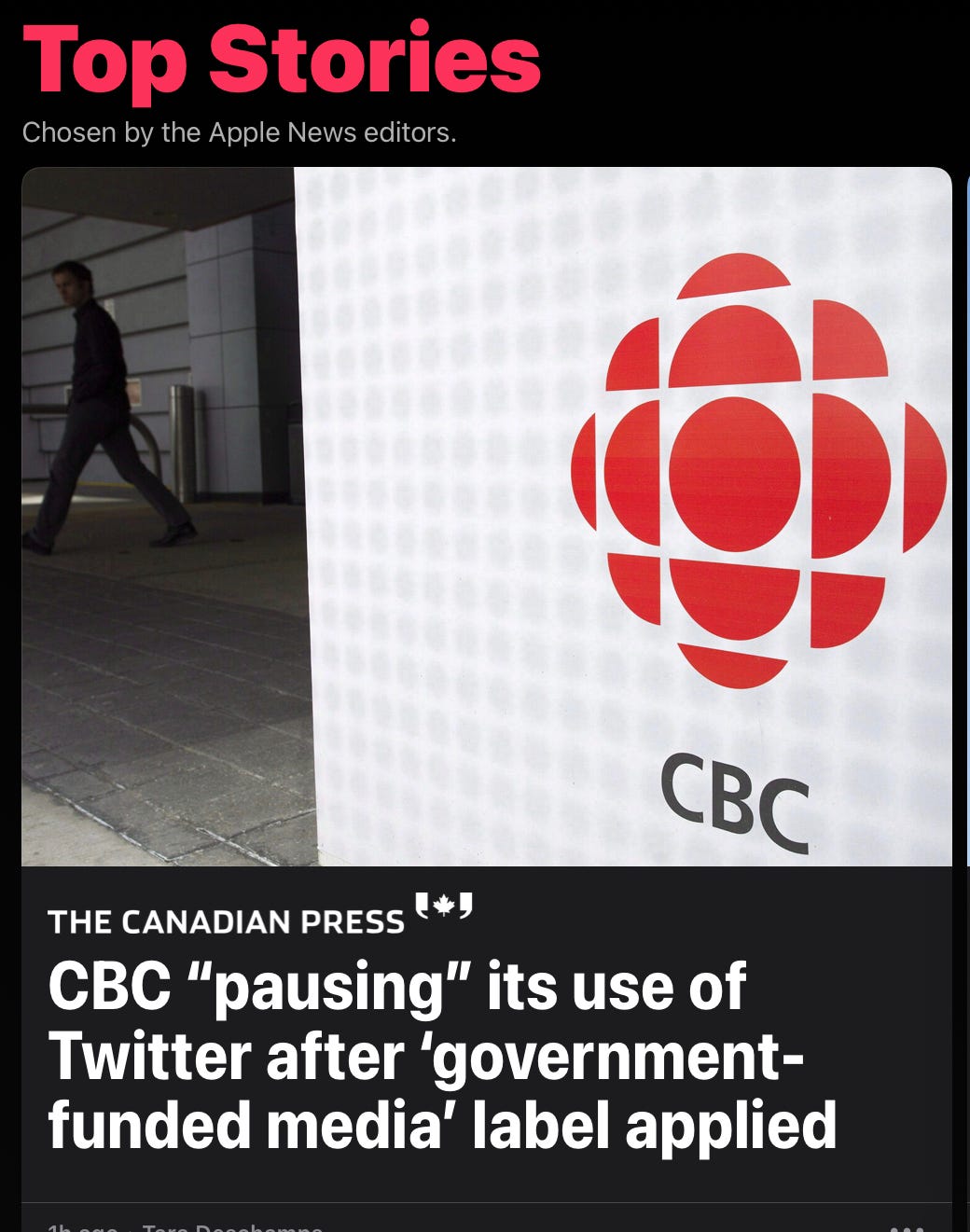Above is a brief clip from former journalist Rodney Palmer’s recent testimony before The National Citizen’s Inquiry, which was organized to investigate how Canadian governments and institutions responded to the pandemic. I encourage readers to watch it in it’s entirety here.
In the clip he notes how in 2021 the Canadian Broadcasting Corporation began an initiative to promote trust in its news reporting. I’ll return to this, but first an anecdote about what the CBC once meant to me. And others.
A flat horizon of static with one peak
In the fall of 2000 I was traveling with a girlfriend from Whitehorse to Dawson City, a -40C Yukon journey in a green Volvo along a two-lane hockey rink of highway. There wasn’t much to do on the 534 km drive other than fiddle with the radio dial while enjoying a landscape resembling the ice planet Hoth from Star Wars.
Communications were thin on the Klondike Highway. There was no cell phone service en route, so for safety we had a friend’s satellite phone - an electronic brick with an absurdly long antenna.
The car radio offered a flat horizon of static, the sole exception being a clear signal from CBC Radio North. We listened as the call-in show Vinyl Café dialed a home in Nova Scotia to tell a fan she’d won tickets to the year-end show in Toronto. However, Host Stuart McLean couldn’t get through. He tried again. Deciding not go down the list of entries but to stick with the first winner, he called Nova Scotia directory assistance and asked if the operator could patch him through. This wasn’t feasible for technical reasons, she replied.
McLean tried the residence again. Still busy. He called directory assistance once again, and ended up with a daisy chain of east coast operators on a conference call. One supervisor agreed to take responsibility for interrupting the line to inform the winner. She returned to tell the Vinyl Cafe host she couldn’t get an audio signal through; someone in the home was probably on the Internet (this was the days of dial-up of course, and most people only had landlines).
Getting creative, McLean contacted a pizza joint in the winner’s town, asking a confused delivery guy to relay the message personally, which he did. The winner, mother of the kid sucking up all the bandwidth, finally picked up and was thrilled to have won.
This lengthy Vinyl Cafe episode, which risked sailing past novelty into narcolepsy, turned into a celebratory shtick - funny and oddly moving at the same time. While motoring along the Klondike Highway my girlfriend and I had been drawn into the lives of Canadians on the opposite side of the country, linked together with millions of other listeners through nothing more than a flimsy web of radio waves. We cheered when the host finally got through to the winner.
This anecdote has nothing to do with news or news gathering, obviously. I tell this story for a reason; on this drive long ago I felt the CBC’s mandate that Palmer alluded to in his testimony - to bring Canadians together - as viscerally real.

The Foghorn of Fear
My suspicions that something was off with the Canadian media pandemic narrative began mid-2020. The headlines referred to tens of thousands of COVID ‘cases,’ but a little digging into these very stories revealed this included all recorded cases up to that time. The recovered cases -those who were no longer sick - were being left in, hugely inflating the numbers.
I only heard one instance on CBC Radio where the oddness was noted, by a doctor who said never before had she heard of people who were not visibly or identifiably sick being called ‘cases,’ asymptomatic or not. That was the last peep of contrary medical thinking I ever heard out of Mothercorp on that matter. (Even The New York Times hinted on the medical dodginess of PCR tests. But not the CBC.)
From that point on, I was dismayed to see the broadcaster move in lockstep with the legacy press in abandoning science for The Science™. The critical thinking it had brought to bear on so many news stories of the past was exchanged for a constantly blaring foghorn of fear - something I summed up in this cartoon from a year into the pandemic:
Back to Palmer. As he outlines in his testimony before The Citizens Inquiry, at the outset of the pandemic the CBC and many other news outlets aligned themselves with newly minted but shadowy organizations offering to manufacture consent for the masses, heavily leveraging the word ‘trust.’
The reason they all sound the same is because they're all part of this “trust” campaign. But, the CBC is also part of something else. It something with just public broadcasters. It's called The Global Task Force for public media. “It exists to defend the values and interests of public media.” Excellent, but it was formed to develop a consensus and a single strong voice among them. That's CBC, BBC News, ABC Australia, Korean Broadcasting (joined recently), France Television, Radio New Zealand, ZDF from Germany and SVT from Sweden. I can't imagine, having worked at the CBC for almost a decade and being told every day our job is to elevate the voices of Canadians, on Canadian stories, to unite our , vast country and make us all feel as one. What single issue do we have with Korean Broadcasting when that is our mandate? What issue does Radio New Zealand have with Swedish Television when their mandate is the same, to elevate their own people?
For all its lip service to diversity, the CBC apparently now has little interest in the intellectual variety, preferring the monoculture messaging of WEF-branded globalism. Quite different from the pre-cutbacks CBC of my youth, which serviced the nation with a vast array of regional and national programming on both radio and television.
All it takes is a peek into the comment section of online CBC news stories to see the broadcaster‘s trust initiative isn’t reaching past the true believers. Oh, why would that ever be? Because it suggested ivermectin and other early treatments for COVID were ineffective and even dangerous? Because it has steadfastly avoided mention that all-cause mortality was flat in 2020 during COVID, but rose in 2021 with the introduction of the vaccines? That it now eats up broadcasting schedules with stories and reports involving .3 percent of the population, to the exclusion of 97.7 percent of Canadians?
This just in: CBC no longer trusts Twitter…
TORONTO - CBC/Radio-Canada said it is “pausing” its use of Twitter, a day after its main account was labelled “government-funded media” by the social media platform.
“Twitter can be a powerful tool for our journalists to communicate with Canadians, but it undermines the accuracy and professionalism of the work they do to allow our independence to be falsely described in this way,” CBC media relations director Leon Mar said in a statement announcing the change Monday afternoon.
This is a peculiar statement from the media relations director. It’s false to describe CBC as “government-funded media?” Where then does the non-commercial body get its funding from, Keebler Elves? Though I do appreciate the sensitivity here - Twitter tagging the corporation in this manner suggests that government funding could effect its objectivity on some topics, particularly politics.
Bad Elon, no Adrienne Arsenault interview.
Irony alert. Although CBC is butthurt from Twitter’s labeling and may bail from the social media site, it’s hanging on to it’s TikTok account. Even after the CBC itself reported that Ottawa has directed federal employees not to use government phones to access TikTok because the data-harvesting, Chinese-owned portal is suspected of being a surveillance tool of the PRC.
Why would the trust-seeking CBC be fine with its employees continuing to post to a social media app with an absurdly invasive user license agreement that’s allegedly a vacuum hose for a dictatorial regime? Professional courtesy, perhaps?
Trust™ In Me
The manufacturers of consent want us focused on ‘trust’, because that comes down to an appeal to authority. But if we’ve learned anything in the past 3 years, its that trust shouldn’t be given freely and unearned to either government-funded news sources or privately funded social media giants. Neither the CBC nor the BBC. Not CNN, The New York Times or The Washington Post. Not Fox News, Breitbart, and not Facebook, Instagram, TikTok or Twitter. It doesn’t matter or not if any one of them now seems to be ‘on your side’ or part of your tribe. Because that can and will change. Private or public, the bottom line of these institutions involves little pieces of paper with dead dudes on them. Ultimately, they all render unto Mammon.
In the end, as Rodney Palmer observed, what’s much more important than trust is truth, which is only reachable through that rocky, zigzagging pathway called critical thinking. You know, the inclination toward mental independence that takes the curious down ‘rabbit holes’ while ‘doing their own research.’
I once loved the CBC, and I believe there are still good journalists in its ranks doing high-quality work. During the pandemic, I never found it as reactionary and unhinged as other media outlets, like CTV and The Toronto Star. It meekly suggested social distancing might be involved in the massive increase in Canadian drug overdose deaths in 2020. It even hinted drug overdose deaths were overtaking deaths from COVID in some provinces, which of course was the real story. Most encouragingly, a recent CBC report on the National Citizen’s Enquiry (where Palmer testified) is a straight-up report without any thinly veiled editorializing.
But these glimmers of consciousness have been sporadic and shallow, like Mothercorp was muttering in its sleep. Where was it when the most discriminatory, divisive prime minister in Canadian history branded a significant fraction of the population as ‘racists and misogynists’, and a threat to other Canadians? Snoring.
I could never have known while driving along the Klondike Highway listening to The Vinyl Cafe that the CBC would one day become a means to divide people rather than bring them together. Canadian media, public and private alike, merged into a blunt force instrument for fracturing friendships and families as it broadcast a centralized, Stasi-like script of social harm originating from algorithm-driven authorities.
Now that the CBC has dug itself such a deep hole of credibility, it looks like faces a long, muddy uphill climb past Trust™ toward trust.









What Ails the CBC?